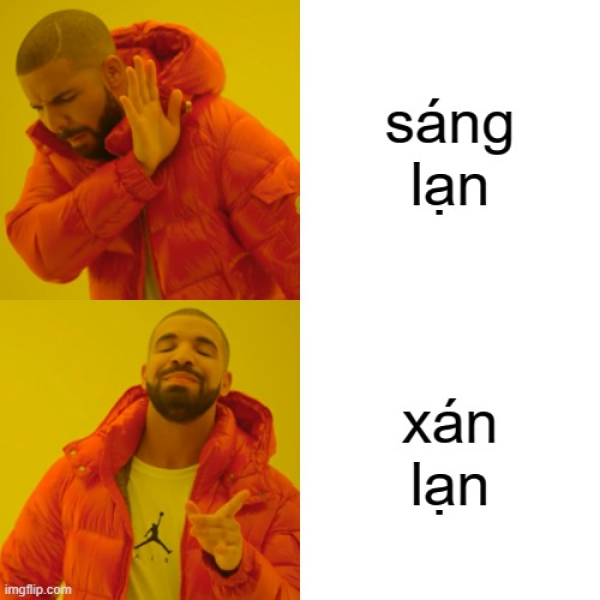list
Scripted by
Hy Truong


What about you? Do you think that the words “xán lạn” look strange or slightly wrong? We all know it’s hard for a spelling mistake to exist in a huge title, after all.
Well, we’ll find out the answer later in this post.
In this series of “COMMON MISSPELLED WORDS IN VIETNAM,” let’s take a look at the typical mistakes that are often overlooked not only in casual conversations but also in formal writing.
One of the main causes of this issue is that parts of Vietnamese are borrowed from another language such as Chinese or French, and sometimes we just think we’re using “pure” Vietnamese while we aren’t. The misspelled words that we’ll see in this post are Sino-Vietnamese, words of Chinese origin. The proportion of Sino-Vietnamese words in the Vietnamese lexicon is estimated to be more than a half, which makes the mistakes that occurs in daily use predictable since we no longer pay attention to which “kind” of vocabulary we’re using.
Below are some of the most frequent spelling mistakes that Vietnamese people make when dealing with Sino-Vietnamese vocabulary:

“Trí mạng” is often used when referring to a “mortal” impact, either literally or figuratively; for example, we might have seen “đòn trí mạng” (critical hit) or “tỷ lệ trí mạng” (critical hit chance) in some random games. But of course, they are all written incorrectly as “chí mạng”.

This expression originates from the Chinese words “致命”: “致” is the verb for “to devote”/“to deliver” and “命” is the noun which means “life.” When these two words combine, it is roughly explained as “to the extent of putting one’s life into something/risking one’s life,” which can be understood as “fatal”.
Although “trí mạng” has existed for a long time and is recorded in the most reliable sources of Vietnamese dictionaries, people somehow tend to use “chí mạng” much more commonly. This is a Vietnamese-composed combination and of course cannot reflect the Chinese origin. The probable reason behind this Vietnamese-made version might be the similar pronunciation. In many regions of Vietnam, “trí” and “chí” are pronounced quite similarly. Also, the word “chí” is used in several expressions that carry the meaning of “fatal” as well; therefore, many people misunderstood that “chí” is the one word that is used in all cases while it is not. Take “chí tử” as a good example, it is also a Sino-Vietnamese word and despite sharing the same overall meaning with “trí mạng,” it is written as “至死” in Chinese, which is a totally different combination with different characters.
“Chí mạng” is so widely used that it can now be considered acceptable, but the correct version of this expression when compared to its Chinese root is indeed “trí mạng.”

Another misspelled phrase that Vietnamese people often use when saying “in conclusion” is “tựu chung,” which should be “tựu trung” instead.
If we break down the words in Chinese, “tựu” is “就” which means to combine and “trung” is “中” which refers to “inner.” When combined, “tựu trung” (就中) can be understood simply as “to combine everything inside.”
The reasons for the misuse of “chung” among Vietnamese people are familiar: the similar pronunciation and relevant meaning of the word itself.
“Chung” is a “genuine” Vietnamese word that means “altogether” and is pronounced quite similar to “trung” in many regions of Vietnam. So “tựu chung” obviously is “to conclude” because it’s “to gather things altogether,” right? Some people even think that “tựu trung” must be misspelled as they don’t know its Chinese root.

One more common misheard and misspelled phrase we often see is “nhận chức.” The correct one must be “nhậm chức,” and it also belongs to the Sino-Vietnamese vocabulary. It is written as “任職” in Chinese and means “to take on a position.”
“Nhậm” is “任,” which means to be in charge of something.
“Nhận” is a pure Vietnamese word that means “to receive.” It has a quite similar pronunciation as “nhậm” and appears much more frequently in both writing and speaking. This leads to the misunderstanding that the phrase “nhận chức” is correct as we can “receive” a job. However, when it comes to taking on a role, we will actually “be in charge of it,” not just “receive it.”

“Sáp nhập” has its Chinese version as well. It’s “插入,” which means “to combine.” Vietnamese people often use this phrase when saying “two organizations are combined.”
“Sáp” is “插” which means “to insert”/“to interject” and “nhập” is “入” which can be translated as “into one another.” When put together, the phrase can be explained as “to be merged.”
Just like foreigners may struggle with the “final sounds” when learning English, we Vietnamese once again mishear the word “sáp” as “sát” (similar to the above case of “nhậm” and “nhận”). “Sát” is a Vietnamese word that means “to be close to each other.” “Two things getting close and then combined” – doesn’t that make so much sense? Well, sometimes we’re just not as “native” as we think we are.


Here we are, finally. Yes, the title “Tinh hà xán lạn” is perfectly fine. (But of course, it must be, just… how?)
“Xán lạn” is a Sino-Vietnamese word that is misspelled and misheard most of the time.
Both these words are of Chinese origin, “xán” is “燦” and “lạn” is “爛,” and both mean “bright.” Vietnamese people often say it as “sáng lạn,” “sáng lạng” or even “xáng lạng.” All of them make no sense. However, this mistake is inevitable because we don’t have “xán” or “lạn” in the Vietnamese original vocabulary, but we do have “sáng.” It is a Vietnamese word that also means “bright” and is pronounced the same as “xán” in many regions of Vietnam. This makes people assume that “sáng lạn” is pure Vietnamese without doubting the potential Chinese origin of the word.
Are there any other misspelled phrases that you think should be included in the list? Feel free to share with us! Also, don’t forget to stay tuned for the next parts of our series and see if there are any new cases that can surprise you.
Hansem Global is an ISO Certified and globally recognized language service provider. Since 1990, Hansem Global has been a leading language service company in Asia and helping the world’s top companies to excel in the global marketplace. Thanks to the local production centers in Asia along with a solid global language network, Hansem Global offers a full list of major languages in the world. Contact us for your language needs!